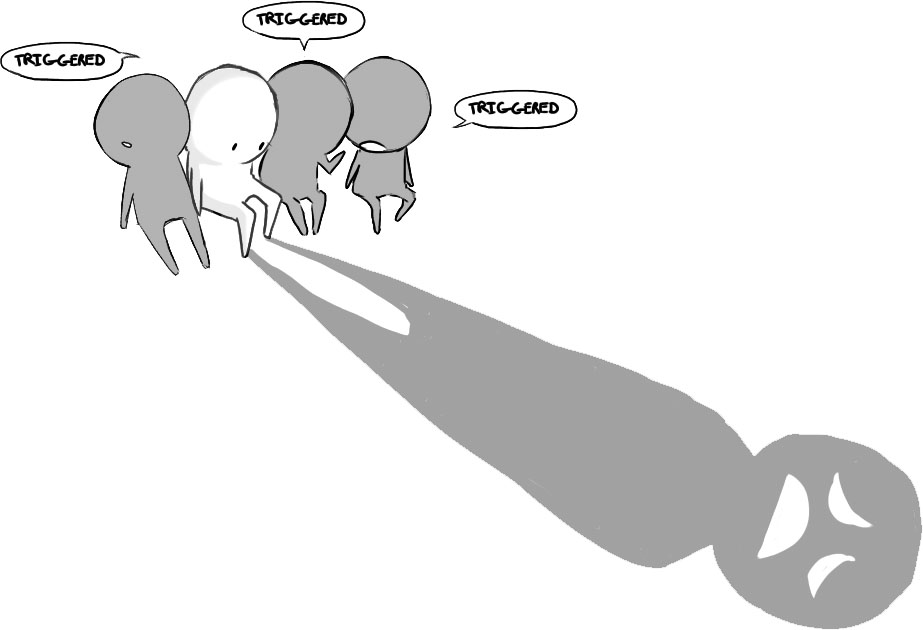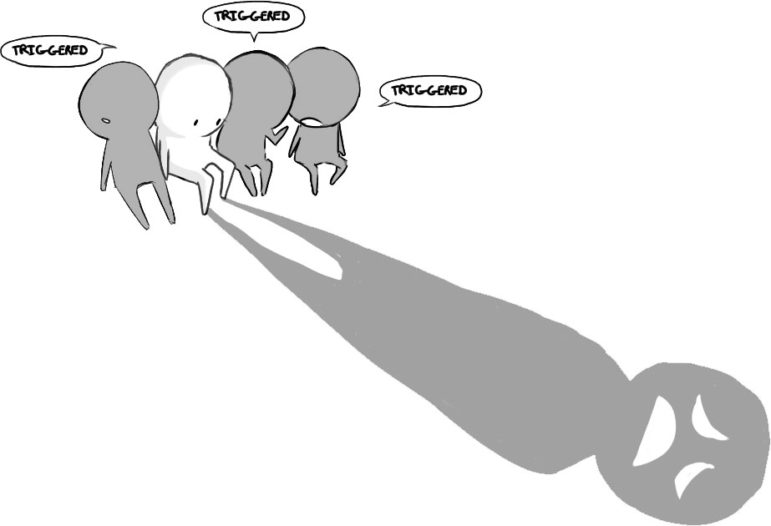

It’s common enough to hear. You’re walking down the hall when you hear a classmate say, “I got such a bad score on that test. I’m so triggered!”
The word “triggered,” which was once used primarily to describe the situational and emotional provocations for symptoms of people with mental illnesses, is now colloquially used as a synonym for “angry” or “annoyed.” This is most often a harmless joke, but it does have negative consequences as perceived by the public.
For people with post-traumatic stress disorder (PTSD), a trigger is something that causes extreme discomfort and often a panic attack, as it forces the affected individual to “relive” their traumatic experience. For example, a person who was attacked by a dog as a child might be triggered by the sight of a neighbor walking their dog. Where others might simply see a fluffy domestic animal, this person might experience crippling fear, as if they know they need to escape right now, as if this is a life-or-death situation. It is a real threat to their well-being and their ability to function in society, but because of the new “triggered” trend, these people are often treated as jokes.
For the benefit of those who need trigger warnings to operate their daily lives, some things, such as stories, TV shows, movies and even sometimes participants in face-to-face conversations forewarn readers and listeners of any upcoming sensitive, potentially triggering material. However, some people seem to interpret this as unnecessary censorship, arguing that they do not need these warnings and therefore should never be exposed to them.
A similar controversy is that of “safe spaces” — places in which LGBTQ+ people or otherwise discriminated against groups may feel safe from verbal and physical abuse. People who are regularly persecuted — perhaps, if their peers make fun of them or even use violence against them — for their identity find it important for safe spaces to be present in their lives so that they can speak freely and epitomize their true selves without fear of harassment in any form.
Again, some believe that the existence of spaces in which no one is judged for who they are is a restriction of their free speech: their right to voice their opinions about anything they choose to, even if it offends someone in the room.
This, of course, is a reasonable position to hold. However, the truth is that some people need safe spaces and trigger warnings, and just because one has the privilege not to need these precautions does not mean that he or she may decide who gets them and who does not. This was even an issue in the most recent presidential election – many people felt threatened by Trump’s presented policies, especially LGBTQ+ people and Muslims, and requested spaces that were safe from his prospective actions that they felt could put them in real danger. People with PTSD and other mental health issues exist. People with histories of persecution exist. It’s important to be considerate of these people instead of complaining that one does not need the limitations they do, and therefore, these limitations should not be in place.
Perhaps instead of complaining, we should work to provide more sufficient care to those who require trigger warnings, and help them recover from whatever trauma they have experienced. Perhaps we should destigmatize the situations of people of color, undocumented immigrants, those with mental illnesses and everyone else who is otherwise mistreated by society so that safe spaces are no longer necessary at all. It might be easier simply to criticize, but it is surely more productive to address the fundamental issues at hand than to speak negatively of them.
Humans as a group are different from each other. We come from different lives, each one of us the main character of our own story. Some of us need safe spaces, some of us need trigger warnings, some of us need both and some of us need neither. It’s important for humanity to learn to recognize all people and their respective situations without delving into selfishness based on one’s own experience. After all, this is the only way to create true equality and mutual respect.





